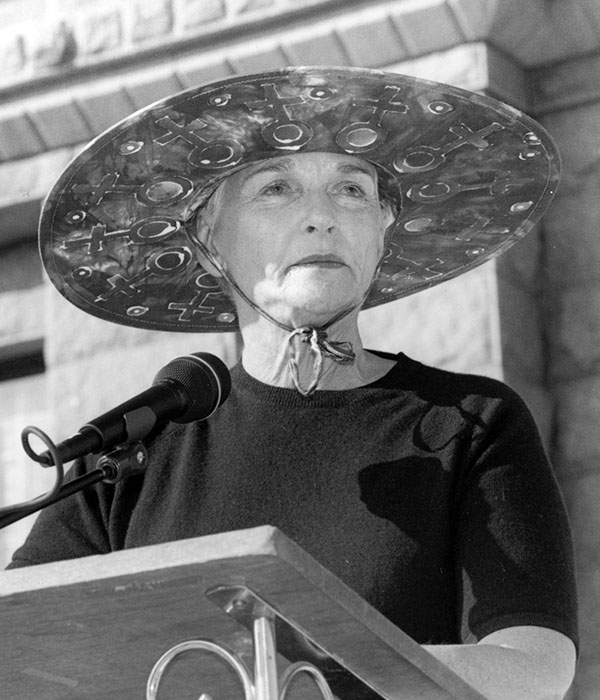Sept. 28, 2021

The Briscoe Center mourns the loss of politician, lawyer, and human rights activist Frances “Sissy” Tarlton Farenthold. Farenthold died on Sept. 26, 2021.
“I’m deeply saddened by the death of my friend Sissy Farenthold, an authentically iconic figure in the history of the human rights movement and the struggle for social and economic justice, not only in Texas, but internationally,” said Don Carleton, the center’s executive director. “I first got to know Sissy nearly fifty years ago, and our lives often intersected from that first meeting.”
“There are many wonderful memories I have of Sissy. Among my favorites is one that relates to her basic goodness and civility. It occurred shortly after the death of former Governor Dolph Briscoe,” Carleton continued. “Sissy had run against Briscoe in the gubernatorial campaigns of 1972 and 1974. Both campaigns were bitterly fought and a lot of mud was tossed, which resulted in many years of bad feelings between the two. A few hours before Gov. Briscoe’s memorial in the Texas capitol, Sissy telephoned me from an airport in California and said she knew I was going to speak. She asked me to make a statement on her behalf: ‘Please tell everyone that Dolph Briscoe was a decent, honorable, and fine Southern gentleman. I’m truly sorry that he has passed away.’
“Sissy Farenthold deeply honored the Briscoe Center by the donation of her historically valuable papers, where they are available for research and teaching,” Carleton noted. “The papers document the full range of her humanitarian and political efforts, and will serve as a lasting reminder of her outstanding contributions to Texas and the world. She has a lasting place among the true heroes of American history.”
The Frances Tarlton Farenthold papers are a significant part of the center’s congressional and political history collections, and its extensive social justice and women’s history holdings. The papers document Farenthold’s support of women’s rights and women’s increased involvement in politics; activism in the nuclear disarmament and peace movements; promotion of civil and prisoners’ rights; international relations; and social and political issues in developing countries.
The materials from her political career include her tenure as Texas state legislator in the 61st and 62nd legislative sessions, participation in the “Dirty Thirty” and reform of political corruption, membership on legislative committees, her campaigns for governor against Dolph Briscoe Jr., and nomination to be the Democratic candidate for the U.S. vice presidency. The papers also document Farenthold’s association with human rights organizations and issues in El Salvador, Honduras, Guatemala, Nicaragua, and South Korea from the 1970s onwards.
The Briscoe Center partnered with the Bernard and Audre Rapoport Center for Human Rights and Justice to present a digital exhibition about Farenthold, featuring extensive materials from her papers and original interviews.
About Sissy Farenthold
Frances “Sissy” Tarlton Farenthold was born on October 2, 1926, in Corpus Christi, Texas. Her father B. Dudley Tarlton, Jr., an attorney, was the son of Judge Benjamin D. Tarlton, Sr., Chief Justice of the Texas Court of Civil Appeals, state legislator, professor at the University of Texas at Austin School of Law, and namesake of the UT Tarlton Law Library. Farenthold graduated from Vassar College in 1946 and the UT Law School in 1949. She began her career in politics in 1960, campaigning for John F. Kennedy as president and serving on the Corpus Christi City Council’s human relations commission until 1965. After serving two years as director of the Nueces County Legal Aid Program, Farenthold was elected as representative for Nueces and Kleberg counties in the Texas Legislature (1968-1972). She also ran twice for the Democratic gubernatorial nomination against Dolph Briscoe (1972 and 1974) and became the first serious, and third ever, female nominee to be the Democratic candidate for the U.S. vice presidency, placing second out of seven.
During her tenure as a state legislator, Farenthold promoted civil and women’s rights, co-sponsoring the Equal Legal Rights Amendment with State Senator Barbara Jordan, and supported environmental protection for beaches, bays, estuaries, and Mustang Island. When opposing Governor Preston Smith’s efforts to expel people registering Mexican Americans to vote in Del Rio, she marched in support of the registration on Palm Sunday in March 1969. With the emergence of the Sharpstown stock fraud scandal, in which Houston banker Frank Sharp was accused of bribing lawmakers in 1971, Farenthold joined other representatives, named by their opposition as the “Dirty Thirty.” The group proposed a resolution for an investigation into the roles played by Texas House Speaker Gus Mutscher and other legislators in the scandal and into the history of the bills Sharp was accused of promoting through bribery. Although the bill did not succeed and redistricting eliminated Farenthold’s district, Mutscher was found guilty of his involvement in the scandal, and Gov. Smith’s political career essentially ended.
After leaving politics, Farenthold continued to support humanitarian causes, including peace activism and opposition to the Vietnam War, and the nuclear disarmament and the nuclear waste disposal movements. She also served as a human rights observer in Iraq, El Salvador, Honduras, South Korea, Guatemala, Nicaragua, Cuba, and the former U.S.S.R.
After teaching law at Texas Southern University, Farenthold served as the first female president of Wells College in Aurora, New York (1976-1980). With numerous national female political figures in 1971, she co-founded the National Women’s Political Caucus, an organization dedicated to increasing women’s participation in government and achieving equality for women, which elected Farenthold as its first national chair in 1973. Five years later, she established the Public Leadership Education Network to support an increased representation of women in government through educational programs for female college students interested in careers in public policy. Upon her return to Texas in 1980, Farenthold opened a law firm and began teaching law at the University of Houston.


